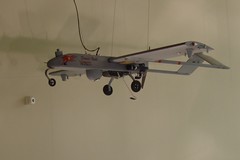President Obama, Congress and the American people face a disturbing choice in 2 battles: Iraq and Afghanistan.
Your teacher's analysis:
In Iraq we have landed far from the mark envisioned by President Bush when he proposed the invasion. In the beginning we attacked the oil-rich nation because the Iraqis were believed to have Weapons of Mass Destruction (WMD's). Having admitted that our intelligence gathering was mistaken about the WMD's, we have stayed in Iraq in an attempt to stabilize the nation.
US forces invaded Afghanistan because the Taliban had sheltered the terrorists known as al Qaeda. Today the once-vanquished Taliban - arch-conservative Muslims - have returned to viability as opponents to the US.
The high tech US soldier has not proven to be a terminator when facing the $1.98 warfare thrown at him by forces in these 2 nations. The Shia rebels have effectively used cheap IED's - Improvised Explosive Devices - to maim and disrupt our corps in Iraq. The Taliban have been effective against us by hiding in and striking from mountain caves.
While he might want to withdraw from both wars as quickly as possible, the president sees the dangers associated with disengagement. In Iraq, a pull-out may well leave the nation in a state of civil war. In Afghanistan, the Taliban would re-assert control and perhaps help al Qaeda regenerate.
The Four Problematic Nations Map:
* Iraq
* Iran (a nation threatening the US via development of an atomic bomb)
* Afghanistan
* Pakistan (a nation which has aided the Taliban and Osama bin Laden)
Is there an alternative to continued wars? Building multi-nation coalitions which buffer nations from violent struggle is a strategy which has not been exhausted.
skip to main |
skip to sidebar
For students and parents who love education and exploration of the social sciences . . .
Search This Blog
Followers
Blog Archive
-
▼
2009
(379)
-
▼
September
(57)
- What hit the Empire State Bldg on a foggy day in 1...
- Central Park: an area called Strawberry Fields har...
- The Chelsea Hotel, NYC, is named for Chelsea, London
- Thurs, Oct 1: Quiz on the Manhattan map and an ope...
- Addendum to the Social Studies Fair guidelines
- Comparison graphic: The US and Canada
- Michael Cera and other well-known Canadians
- Caddo Social Studies Fair 09 instructions for stud...
- Basic research on our quiet neighbor, Canada
- Snazzy, snacky style in titling: make it Snally
- It's the Hard-knock Life - For Us / a quiz on NYC
- Immigration law: a change of policy toward the Chi...
- An alternative to the almost-weekly hand-sketched ...
- NYC celebrating 400 years since the Dutch establis...
- 12 National Merit Semi-finalsts at Caddo Magnet; o...
- Cooking / cuisine guidelines for geography class
- Manhattan, the Bronx, Brooklyn, Queens and Staten ...
- Enriched geography has additional requirements: re...
- The value in geography class is not in the facts
- Syllabus: Geography Trudeau 09 - 10
- A wee quiz on 3 ginormous cities
- NYC: Five Boroughs
- Getting oriented to NYC
- Navy Pier Dog; hmm.
- Steven Spielberg and a handful of personalities fr...
- A Man with a hat of tan and four more boroughs in NYC
- A pivotal unit: what the 22 million people in the ...
- Comparing Chicago's "Bean" to Shreveport's 8-story...
- Progress reports in my geography classes on Tuesday
- Back to School night Thurs, Sept 17, 6 pm
- Is California the most populous state, or is New Y...
- Chicago, the Windy City, the capital of the Midwest
- Adam: an indie movie at Robinson Film Center about...
- Filet-O-Fish, sir? Deep-sea fish and the challenge...
- Sample questions from the Urban Quiz Bowl / LA, NY...
- Parents & students: please make sure you've taken ...
- Back to school dance Fri, Sept 11, 6 - 9 pm: three...
- Geography open notes quiz on Sept 10; call it Tres...
- Three great cities the topic for an Urban Quiz Bow...
- Terminology: the Liberal and the Conservative
- Pacific rim states and open notes quiz on Thurs
- Presidential dilemma: how to proceed in Iraq and A...
- This weekend: the DeSoto-Hudson / Erie-Hudson-Miss...
- America's Great Rivers - the West
- Don't forget to complete the Graphic Comparison on...
- How to excel in geography class - and at Magnet
- Geography class academic reading: Upfront monthly
- Geography class music notes: Carmina Burana, JS Ba...
- The "Water, water, everywhere" quiz
- Daily terminology in geography class: "May I go to...
- Geography class academic, in-class reading: Upfron...
- National Geographic: Losing Louisiana's coastline
- Pan and Gaia: the supercontinent called Pangaea
- The Mississippi Delta: an eroded finger of silt th...
- The water and wind currents that move men and stor...
- Basic facts in a Katrina review
- Map of New Orleans flooding from Hurricane Katrina
-
▼
September
(57)

